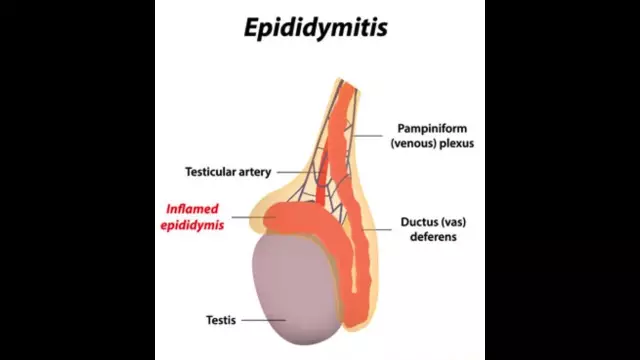- Author Rachel Wainwright wainwright@abchealthonline.com.
- Public 2023-12-15 07:39.
- Last modified 2025-11-02 20:14.
Epididymitis
Epididymitis is an inflammation of the epididymis, which can be an independent disease, and can accompany other inflammatory diseases of the male reproductive system. Epididymitis occurs at any age, including children. Distinguish between acute epididymitis, chronic epididymitis and exacerbated. By the nature of the inflammation, the process can be serous, purulent and infiltrative.
Causes of epididymitis

Epididymitis can occur as a result of an ascending infection entering the body from the external genital organs, a descending infection when the pathogen enters the epididymis from the intestine, bladder or prostate. In some cases, epididymitis is a complication of a general infectious disease of the body (flu, tonsillitis, tuberculosis, etc.) or trauma to the perineum, including the operating room. One of the types of traumatic epididymitis is inflammation of the epididymis after ligation of the seminal ducts, caused by impaired sperm evacuation, and the resulting stagnation.
The causative agents of epididymitis in adults are most often urogenital infections, they are also sexually transmitted infections (UGI or STIs): gonococci, chlamydia, ureaplasma, mycoplasma, trichomonas. In the case of a descending infection, it is usually E. coli, Proteus, staphylococci or streptococci.
Factors contributing to the development of epididymitis are:
- Hypothermia;
- The presence of diseases of the genitourinary system;
- The presence in the body of foci of chronic infection;
- Acute and chronic perineal trauma;
- Sedentary, especially sedentary lifestyle;
- Irregular and promiscuous sex life;
- Failure to comply with the rules of personal hygiene.
Symptoms of epididymitis
Symptoms of epididymitis depend on whether the inflammation is acute or chronic. As a rule, initially the disease occurs acutely, and chronic epididymitis is the result of untreated or untreated acute epididymitis.

Symptoms of acute epididymitis: sharp pain in the perineum, aggravated by movement, at first not localized, then concentrating in the testicle on one side. The scrotum is swollen and enlarged from the side of inflammation, there is redness, the skin pattern is smoothed. Acute epididymitis is accompanied by a rise in temperature to 38-39 ° C, fever, deterioration of the general condition, headaches and muscle-joint pain. Prehn's symptom is positive: pain relief when lifting the scrotum. This distinguishes acute epididymitis from testicular torsion, in which Prehn's symptom is negative.
Symptoms of chronic epididymitis are usually less pronounced, and sometimes they may be absent altogether, manifesting themselves only during exacerbations. Chronic epididymitis manifests itself as a soreness of the testicle when walking and an increase and hardening of the epididymis, which, on palpation, feels like a formation, tightly adhered to the testicle and slightly painful.
Diagnosis of epididymitis
The diagnosis of acute epididymitis is straightforward, and is based on anamnesis and examination of the external genitalia. In chronic epididymitis and aggravated epididymitis, ultrasound of the scrotum is performed. For the diagnosis of epididymitis, identification of the causative agent that caused the inflammation is critical. For this purpose, a bacterial culture and laboratory examination of the contents of the urethra, as well as a bacterial culture of urine, are carried out. If an STI-related epididymitis is suspected, all necessary tests are performed to identify the causative agent of urogenital infection.
Epididymitis treatment
Treatment of epididymitis depends on the form of the disease, but its scheme is similar in both cases: antibacterial therapy to eliminate the pathogen, anti-inflammatory therapy, prevention and elimination of complications of inflammation.
Treatment of acute epididymitis: a course of antibiotic therapy is prescribed with the use of broad-spectrum antibiotics; in children, sulfa drugs (bactrim) are used. Also, non-hormonal anti-inflammatory and analgesic drugs are prescribed, cold to the perineal area, bed rest with an elevated position of the scrotum, while moving, wearing a suspensor (supporting bandage or tight swimming trunks). A diet is recommended that excludes the consumption of spicy, fatty, fried, smoked, salty foods. When the acute symptoms of epididymitis subside, physiotherapeutic procedures are started: warm baths of medicinal herbs, warming compresses on the affected area, microwave, laser, magnetotherapy and other procedures aimed at relieving inflammation and preventing the development of adhesions.
Treatment of chronic epididymitis consists in the appointment of antibiotic therapy, taking into account the identified pathogen, the use of steroid anti-inflammatory drugs, the active use of physiotherapeutic agents, absorbents, as well as general strengthening therapy (vitamin therapy, immunocorrection). When an STI is identified as the causative agent of chronic epididymitis, it is necessary to treat the patient's sexual partner, otherwise a relapse of the disease is inevitable. For the period of active therapeutic measures, abstinence is necessary. Treating chronic epididymitis requires perseverance and patience, but it must be brought to complete healing.
In case of failure of conservative treatment of epididymitis and the development of an abscessed form, or persistent chronic epididymitis, proceeding with constant exacerbations, they resort to epididymectomy - an operation to remove the epididymis.
Complications of epididymitis

Complications of acute epididymitis are: abscess of the epididymis, the transition of the disease into a chronic form, which is an unfavorable outcome, since the treatment of chronic epididymitis is more complex and time-consuming. An abscess of the epididymis is the development of purulent inflammation, as a result of which the epididymis can completely melt. This is a formidable complication, as the process can spread to neighboring organs. With an abscess of the appendage, hospitalization and emergency surgical care are required. The abscess is opened, the pus is removed, the wound is washed with antiseptics and drained. surgical treatment is complemented by the appointment of a course of antibiotic therapy.
A complication of chronic epididymitis is obliteration (obstruction due to adhesions) of the epididymis. Chronic epididymitis in most cases is bilateral, and the development of bilateral obstruction of the epididymis leads to obstructive infertility. In this case, surgical restoration of the patency of the vas deferens may be required.
YouTube video related to the article:
The information is generalized and provided for informational purposes only. At the first sign of illness, see your doctor. Self-medication is hazardous to health!






